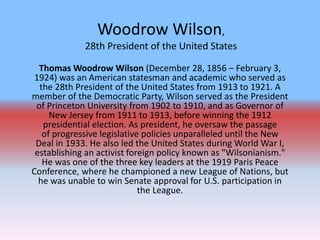
Wilson: 28th US President Led Country in WW1
- 1. Woodrow Wilson, 28th President of the United States Thomas Woodrow Wilson (December 28, 1856 – February 3, 1924) was an American statesman and academic who served as the 28th President of the United States from 1913 to 1921. A member of the Democratic Party, Wilson served as the President of Princeton University from 1902 to 1910, and as Governor of New Jersey from 1911 to 1913, before winning the 1912 presidential election. As president, he oversaw the passage of progressive legislative policies unparalleled until the New Deal in 1933. He also led the United States during World War I, establishing an activist foreign policy known as "Wilsonianism." He was one of the three key leaders at the 1919 Paris Peace Conference, where he championed a new League of Nations, but he was unable to win Senate approval for U.S. participation in the League.
- 2. Early Life • Wilson was born to a Scots-Irish American family in Staunton, Virginia, on December 28, 1856, at 18–24 North Coalter Street (now the Woodrow Wilson Presidential Library). He was the third of four children of Joseph Ruggles Wilson and Jessie Janet Woodrow. Wilson's paternal grandparents immigrated to the United States from Strabane, County Tyrone, Ireland (present- day Northern Ireland), in 1807. His mother was born in Carlisle, England, the daughter of Rev. Dr. Thomas Woodrow from Paisley, Scotland, and Marion Williamson from Glasgow.
- 3. Education • Wilson began reading at age ten; the delayed start was possibly caused by dyslexia. He later blamed the lack of schools. As a teen, he taught himself the Graham shorthand system to compensate, and achieved academically with self- discipline, studying at home with his father, then in classes at a small Augusta, Georgia school. During Reconstruction, Wilson lived in Columbia, South Carolina, from 1870 to 1874, while his father was a theology professor at the Columbia Theological Seminary. • His father moved the family to Wilmington, North Carolina, in 1874 where he was the minister at First Presbyterian Church until 1882. Wilson attended Davidson College in North Carolina for the 1873–74 school year, cut short by illness, then transferred as a freshman to the [[Princeton University|College of New Jersey (later renamed Princeton University)]]. He graduated in 1879, a member of Phi Kappa Psi fraternity. In his second year, he studied political philosophy and history, was active in the Whig literary and debating society, and wrote for the Nassau Literary Review. He organized the Liberal Debating Society and later coached the Whig–Clio Debate Panel. In the hotly contested presidential election of 1876, Wilson declared his support for the Democratic Party and its nominee, Samuel J. Tilden.
- 4. Academic career • Wilson worked as a lecturer at Cornell University in 1886–87, where he joined the Irving Literary Society. He next taught at Bryn Mawr College from 1885 until 1888, teaching ancient Greek and Roman history; while there, he refused offers from the universities of Michigan and Indiana.When Ellen was pregnant with their first child in 1886, the couple decided that Ellen should go to her Aunt Louisa Brown's residence in Gainesville, Georgia, to have their first child; she arrived just one day before the baby, Margaret, was born in April 1886. Their second child, Jessie, was born in August 1887. • In 1888, Wilson left Bryn Mawr for Wesleyan University; it was a controversial move, as he had signed a three-year contract with Bryn Mawr in 1887. Both parties claimed contract violations and the matter subsided. At Wesleyan, was inducted into Phi Beta Kappa and coached the football team and founded the debate team, which bears his name.
- 5. Political science author • Wilson, a disciple of Walter Bagehot, considered the United States Constitution to be cumbersome and open to corruption. Wilson favored a parliamentary system for the United States and in the early 1880s wrote, "I ask you to put this question to yourselves, should we not draw the Executive and Legislature closer together? Should we not, on the one hand, give the individual leaders of opinion in Congress a better chance to have an intimate party in determining who should be president, and the president, on the other hand, a better chance to approve himself a statesman, and his advisers capable men of affairs, in the guidance of Congress." • Wilson's first political work, Congressional Government (1885), advocated a parliamentary system. He critically described the United States government, with frequent negative comparisons to Westminster. Critics contended the book was written without the benefit of the author observing any operational aspect of the U.S. Congress, and supporters asserted the work was the product of the imagination of a future statesman. The book reflected the greater power of the legislature, relative to the executive, during the post-bellum period. Wilson later became a regular contributor to Political Science Quarterly, an academic journal.
- 7. • Student: Savulescu Ionut-Viorel • Profesor coordonator: Frumuselu Mihai Daniel